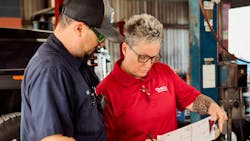Workplace Culture Drives Employee Management
Tire dealers of all sizes, and in every market, are doing their best to find, hire and manage employees. There’s no one-size-fits-all solution. No one has discovered a secret underground of fully trained automotive technicians to combat the shortage.
But dealers are zeroing in on their own solutions to simplify and fortify their efforts. And sometimes there are seemingly little things that bring relief to the process.
MTD’s reigning Tire Dealer of the Year Beth Barron, CEO of Chabill’s Tire & Auto Service, which is based in Morgan City, La., says her company started having new hires fill out their onboarding paperwork electronically — and at home — before they ever reported for their first day on the job.
It gave new hires abundant time to handle the paperwork and allowed them to jump directly into training and other parts of the onboarding process once they were on site for the first day. It also started employees’ digital personnel records.
“It helped us streamline that process,” says Barron.
And while those details and processes are important, tire dealers say they are more often focusing on the big picture.
The human touch
At Chapel Hill Tire, comprehension is key to creating an environment where employees thrive and grow.
Angel Koon, human resources generalist at Chapel Hill Tire, says she interacts with employees every day — and multiple times a day — via in-person conversations, online messages, phone calls or texts.
With 12 locations across North Carolina, Koon says constant communication and understanding are what make Chapel Hill Tire stand out when it comes to managing employees and creating an attractive culture for employees.
“One of the biggest things that I find, not only through the hiring process with candidates, but also when they get into our company, (is) candidates really just want to be treated like humans.
“They want transparency. They want a realistic job preview. We have a family- friendly schedule we highlight to show they’re not selling their souls to us.”
Koon says it can be easy to forget that the hiring process isn’t just a decision the company is making. It’s a decision for the candidate, as well.
She always asks candidates why they are leaving their current job and position.
“I’m not doing this to give them a chance to talk smack, but what I really want to know is. ‘What’s got you looking for jobs?’
“Why are you leaving? Because if it’s something that we do too, it’s not going to be a good fit and we can tell them honestly, ‘Hey this is something we prioritize in our shop, too, so I don’t know if this is going to be any better for you.’”
If the issue is something that Chapel Hill has already combated, Koon says she can let the candidate know what they have done to counterbalance the situation.
Koon says she always prefaces these questions by telling candidates why she is asking. “If you tell me your pay was a certain number and that’s industry standard and what you would make here, I am going to tell you that straight away.”
She says it doesn’t make sense for someone to join the dealership, only to leave a few months later “when we could’ve nipped it in the bud.”
Asking good questions throughout the interview and hiring process can also ensure new hires are placed in the right locations. Koon says it’s helpful to see that each store and team has its own dynamic.
Just because a candidate lives in a certain area and applies for a position at a certain Chapel Hill location, doesn’t mean they are the best fit for that location, she notes.
“I’d rather them drive 10 extra minutes to be at a store they are going to be happier at and be part of a team that is going to enjoy having them.
“I’m honest with them and say something like, ‘Hey, I know you applied for this position — it’s closer to you and that makes sense — but based on what you’ve told me about what you don’t prefer, are you interested in this (other) store that has an opening, as well?’”
That means Koon must know store managers and their managerial styles.
She says that matching the right pieces and personalities “has been a huge piece for us.”
Koon says Chapel Hill Tire is focused on hiring for quality over quantity.
“The trickle-down effect of poor hiring decisions impacts more than just the role you hire for. It affects the whole team. When you have a rotating seat month over month, it’s just not efficient.”
When Chapel Hill Tire is faced with having to fill a role quickly, the dealership first looks at the talent it already has.
“We have 11 other locations we could pull from and we are able to share resources to really help and support the company as a whole — and our team members,” says Koon.
She believes “listening to your team” is one of the simplest ways to reduce turnover.
“People always say communication is key, but it’s really not. You can communicate all you want, but if the other person is not receiving or understanding it, it’s worthless. Comprehension is really the big piece.”
Because of this, Koon says Chapel Hill Tire prioritizes employee feedback. The company often uses that feedback as the base for its new initiatives.
Koon says Chapel Hill Tire employees have daily interactions with their managers and leadership, as well as weekly and monthly check-ins.
Every six months, employees sit down with a human resources director, a director of training and a manager to talk about where the employee is now and where they want to be in their career.
Then they present the steps to help the employee achieve his or her objectives within the company. This includes training opportunities.
Chapel Hill Tire pays for ASE certification tests A1 through A8 for automotive technicians and allows for multiple tests until the employee passes the exam.
“And the beautiful part is, that it’s not just us saying, ‘You get a dollar more per hour because we like you.’
“It’s Chapel Hill paying for ASE certification tests for technicians, so they can get a dollar more per hour for each certification. We ensure that our pay matches industry standards. We just did a salary survey at the end of 2024.”
A transformation for the new age
For Barron and Chabill’s Tire & Auto Service, employee management comes down to a single word. Actually, it boils down to a single day of the week: Saturday.
In 2020, Barron was faced with either adding personnel to transform half-day Saturdays into another full-length, fully-staffed work day at all 18 of the company’s locations — or transitioning to a Monday through Friday schedule.
Saturdays were becoming problematic because there were more complaints due to half-sized work crews. Plus more consumers were apt to sit in a store lobby waiting on their vehicle. It wasn’t a good combination.
Barron decided to test a five-day work model. Week day hours were extended by 30 minutes each day and managers were given one year to prove they could maintain their sales and profitability without Saturdays. If they failed, every store would transition to six full days, Monday through Saturday.
They didn’t fail and now Barron sees the five-day work week as the biggest tool in her employee management tool belt. It’s been a major differentiator for Chabill’s Tire & Auto Service.
“I think we’re able to hire people because of that and I also think that our employees are happier because of that.
“The big thing is not about managing the employees so much once they get here. It’s about finding good ones and keeping the good ones.
“We have plenty of employment-type of processes inside our company, whether it’s evaluations or counseling and warning and training logs — all those things.
There’s nothing earth-shattering about any of that. Everybody should be doing those things, be diligent about improving their employees and holding people accountable. That should be a given.
“But for me, I think not being open on Saturdays has really helped us in the long run.
“The people who are still open six or seven days a week — their fear, of course, is that they’re not serving a customer (and) they’re missing sales,” she says. “It was a much easier decision for me because Saturdays weren’t our best day and we weren’t open all day.”
A year after the switch Chabill’s Tire & Auto Service’s total sales, gross profit and net profit all improved. Plus, Barron says, the tire dealership eliminated a lot of headaches related to overtime.
Now, the five-day work week is part of the culture at Chabill’s Tire & Auto Service, though she knows it’s not a one-size-fits-all solution.
“I just decided I couldn’t compete with my competitors. I wasn’t going to be open as long as Mavis. I wasn’t going to be open as many hours as the (tire manufacturer-owned) stores. I opted to choose a schedule that was better for my employees.”
And it’s turned into a great benefit when recruiting and hiring new employees.
Barron says the schedule allows Chabill’s Tire & Auto Service to offer more of what employees are looking for in an employer.
“To be able to tell a technician, ‘You’re never going to have to work on a weekend when you come to work for us’ — it makes a difference.
“I just find that nowadays, people who are coming into the workforce, how much money they make is second to how much time they’ll have to live their life outside of work,” she says. “It used to be that we couldn’t kick people out of the shop because they wanted to work as many hours as humanly possible. Now, if we tell somebody, ‘We need you to stay a half hour,’ they look at you like you’ve grown two heads. It’s just a different mentality.”
Telling the family story
With a workforce of approximately 1,500 spread across multiple states up and down the East Coast, McCarthy Tire Service Co. Inc., which is based in Wilkes-Barre, Pa., has reinvented what a new employee’s first day at the tire dealership looks and feels like.
“We believe that culture and (the) work environment are our main keys to attracting and hiring talent these days,” says Mary Kate Henry, human resources manager and a part of the fourth generation of McCarthys to work at the tire dealership.
She says the culture starts at the corporate office and with the McCarthy family.
“We created a new hire onboarding training. On their day one, we start them with a welcome video to McCarthy Tire and it explains who we are, where we’re going (and) where we’ve come from, with our history.”
By introducing new employees to the family’s story, Henry says “their expectations of the culture —who we are in our work environment — is established from day one.”
And spreading that message via video ensures consistency. It’s no longer up to a local manager to tell the McCarthy Tire Service story — which dates back to 1926 — while also covering nitty-gritty details of daily responsibilities. Plus the video offers the benefit of employees hearing about expectations and priorities directly from top leadership.
Gary Lambert Jr., vice president of purchasing and vendor relations and another member of the McCarthy fourth generation, says the “culture has to be right for people to want to come to work here and that starts from the top down.
But it’s also at the store local level, where we give flexibility to that manager to run and create the environment for that location to have it be a space (where) people want to come to work.”
The goal is for McCarthy Tire Service employees to say, “I really like what I do. I really like the environment that we work in. It’s rough and tough. It’s dirty, but it’s rewarding.”
Lambert says McCarthy Tire Service offers referral bonuses to encourage employees to share their experience and spread the word about open positions.
“That goes a long way.”
Henry says the referral process works.
The paperwork crosses her desk every day and there have been times that a location manager has a staff opening and says there’s no need to advertise it because the manager already has a pool of candidates interested in joining the McCarthy Tire team.
It’s been five years since McCarthy Tire Service unveiled that initial video and Henry notes that every store manager utilizes it as part of the onboarding process.
She takes that as a good sign that managers see the benefits and have “bought into how we want to operate.”
The video that tells the McCarthy story dovetails into other critical, dayone messages about safety and training.
The dealership previously used generic safety videos, but has also invested in filming its own to demonstrate the standards and practices McCarthy Tire Service utilizes, whether in a service bay or on a road-side call.
All of these messages are reinforced during other regular meetings throughout the year, as well as during the dealership’s annual leadership meetings.
“There are new laws — new things coming out — (and) we need to tell our managers how to do something best,” says Henry. “We can give them examples and things we see on a daily basis, but then we take their feedback. That’s how we’ve evolved. In order for us to get better, we have to listen to everyone.”
About the Author
Madison Hartline
Associate Editor
Madison Hartline (Gehring) is the associate editor for Modern Tire Dealer and Motor Age. Since joining MTD after graduating from The Ohio State University in 2022, she has taken on the role of managing the brand’s social media strategy, producing podcast episodes and overseeing eNewsletter content.
Don't miss Hartline's next article. Sign up for MTD's newsletter.
Joy Kopcha
Managing Editor
Joy Kopcha joined Modern Tire Dealer and Auto Service Professional as senior editor in 2014 after working as a newspaper reporter for a dozen years in Kansas, Indiana and Pennsylvania. She was named managing editor of MTD and ASP in 2022, and took on that same role with Motor Age in 2024.
She is an award-winning journalist, including in 2023 when she was named a Jesse H. Neal Awards Finalist.
Don't miss any of her articles. Sign up for MTD's newsletters.




